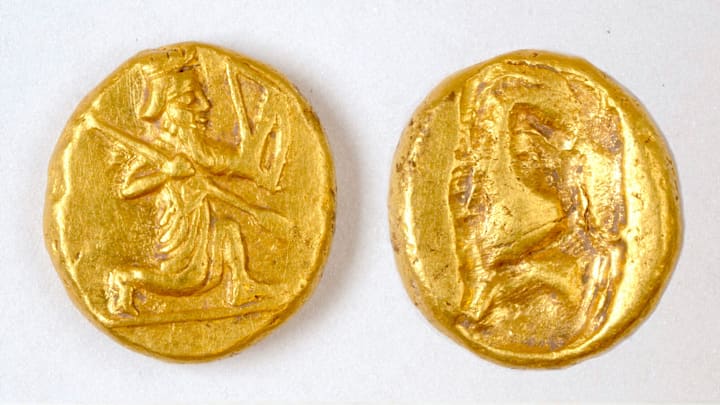The ancient Greek city of Notion, on Turkey’s Aegean coast, is mentioned frequently in the writings of Livy, Aristotle, and Herodotus. In 2023, archaeologists excavating the ruins made what is possibly their most exciting discovery yet: a small pot containing a “hoard of gold coins.”
The team from Brown University and the University of Michigan began surveying every inch of the grid-planned city’s 80-acre footprint, in collaboration with Greek and Turkish institutions, in 2014. They’ve unearthed traces of fortified walls, a theater, an agora (public square), a heroon (hero’s shrine), and even a small temple of Athena. In 2022, with permission from Türkiye’s Ministry of Culture, they began to further excavate the courtyard of a house close to the agora—where they stumbled upon the hoard of gleaming gold coins. Turkish authorities allowed the publication of the find in August 2024.
Not Just Loose Change
The coins are Persian darics, a currency used in Asia Minor from the 6th century BCE, when they were introduced by their namesake Darius I, until Alexander the Great’s conquest of Persia in 330 BCE.
The coins found at Notion—which, like virtually all darics, are decorated with engravings of a kneeling archer—appear to date to sometime during the 5th century BCE. Christopher Ratté, a Classical archaeologist at the University of Michigan and director of the Notion Archaeological Project, suggests they were minted in the city of Sardis, 60 miles north of Notion.

Considering that Notion spent much of the 6th century BCE caught in regional conflicts, it’s likely the coins were intended to pay mercenaries. Which ones, however, is hard to say. Contenders include Persian troops from the neighboring city of Colophon, who occupied Notion from 430 to 427 BCE; or Paches, an Athenian general who attacked the Persian sympathizers after luring them into an ambush in 427 BCE. Or, the coins could have traded hands after a naval battle during the Peloponnesian War in 406 BCE or during a Persian rebellion in the 360s BCE.
“Spectacular Find”
What makes this pot of gold particularly significant is its discovery in an undisturbed site. Ancient coins are often snatched up by looters and removed from their archaeological context before scientists have a chance to study them. The fact that the coins were found where they were left centuries ago makes them a “spectacular find … of the highest importance,” Andrew Meadows, a professor of ancient history at Oxford University, said in a statement.
The key question behind the discovery—why the hoard was buried and forgotten—remains unanswered. “The discovery of such a valuable find in a controlled archaeological excavation is very rare,” Ratté said in the statement. “No one ever buries a hoard of coins, especially precious metal coins, without intending to retrieve it. So only the gravest misfortune can explain the preservation of such a treasure.”
Read More Stories About Archaeology:
